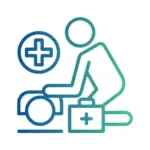
Rehabilitation medicine, also known as physical medicine and rehabilitation (PM&R), focuses on restoring functional ability and improving the quality of life for people affected by physical impairments or disabilities. This medical specialty addresses a wide range of conditions, including stroke, spinal cord injury, traumatic brain injury, amputations, and chronic pain. The goal is to enhance patients’ independence through customized treatment plans that may include therapeutic exercises, assistive devices, and medication management.
Rehabilitation medicine bridges acute medical treatment and long-term recovery, ensuring patients receive continuous care that adapts as their needs evolve. This holistic care model recognizes the complex interplay between physical health, mental wellness, and social participation, making it indispensable in modern healthcare.
Rehabilitation offers profound benefits that extend beyond physical healing, positively impacting overall health and life satisfaction. By addressing functional limitations early, rehabilitation reduces the risk of complications such as muscle atrophy, joint stiffness, and pressure sores. It also improves cardiovascular fitness, respiratory function, and pain management, promoting holistic recovery.
Additionally, rehabilitation helps manage chronic conditions, preventing further deterioration and hospital readmissions. Through targeted exercises and education, patients learn self-management strategies that promote long-term health. Rehabilitation can significantly shorten recovery times and improve outcomes, making it a cost-effective and patient-centered approach. Overall, it empowers individuals to achieve their maximum potential, improving both physical function and quality of life.
Despite its proven effectiveness, rehabilitation medicine is often misunderstood. A common misconception is that rehabilitation is only necessary for those with severe disabilities or after major surgeries. In reality, rehabilitation benefits a broad spectrum of individuals, including those recovering from minor injuries, chronic illnesses, or even psychological trauma.
Another myth is that rehabilitation guarantees full recovery in every case. While rehabilitation aims to optimize function, it recognizes individual limits and focuses on maximizing abilities rather than complete cure. Dispelling these misconceptions helps patients and families embrace rehabilitation as a proactive, ongoing process integral to healing and well-being.
Children may require rehabilitation services due to congenital conditions, developmental delays, injuries, or illnesses that impact physical, cognitive, or communication abilities. Early intervention through rehabilitation can profoundly influence a child’s growth, learning, and social integration. Conditions commonly addressed include cerebral palsy, muscular dystrophy, traumatic brain injury, and developmental disorders such as autism spectrum disorder.
Pediatric rehabilitation often involves family education and involvement, empowering caregivers to support progress at home. Collaborative care with schools ensures children receive the necessary accommodations for academic success. Timely and tailored rehabilitation services foster better long-term outcomes, allowing children to reach developmental milestones and participate actively in their communities.
Rehabilitation services are provided in diverse settings to meet patients’ varying needs and stages of recovery. Hospitals often offer inpatient rehabilitation units for individuals requiring intensive, multidisciplinary care immediately after injury or surgery. These units are equipped with specialized staff and facilities to support complex medical needs alongside physical therapy.
In some cases, specialized rehabilitation facilities cater to specific conditions such as stroke or spinal cord injury centers. Tele-rehabilitation is emerging as a complementary option, leveraging technology to deliver remote therapy and monitoring. The choice of setting depends on the severity of impairment, patient preferences, and available resources. Coordinated care across these environments ensures continuity, supporting gradual progress toward functional independence.
Rehabilitation aims to restore function, reduce disability, and improve quality of life by addressing the physical, emotional, and social consequences of injury or illness. It uses a holistic approach that includes physical exercises, pain management, assistive technology, and psychological support to maximize recovery.
Beyond physical recovery, rehabilitation provides emotional counseling to help patients adjust to new limitations and rebuild confidence. It also educates patients and families on managing chronic conditions and preventing complications. Customized interventions focus on individual goals, whether returning to work, resuming hobbies, or simply improving independence. Ultimately, rehabilitation transforms medical recovery into meaningful life improvements, enabling individuals to lead fulfilling, active lives.
Rehabilitation medicine stands as a vital component in healthcare, dedicated to helping individuals reclaim their independence and improve their quality of life following illness or injury. It offers a comprehensive approach that integrates physical, emotional, and social rehabilitation tailored to individual needs. By bridging the gap between acute treatment and long-term recovery, it fosters resilience and empowers patients to overcome challenges.
Oxford Hospitals provides advanced rehabilitation services backed by a multidisciplinary team committed to delivering personalized care. Through innovative techniques and compassionate support, Oxford Hospitals ensures that every patient receives the guidance and resources necessary to regain function and reintegrate into their daily lives. Embracing rehabilitation medicine not only accelerates recovery but also transforms the healing journey into one of empowerment and renewed potential.
Rehabilitation medicine is a medical specialty focused on restoring functional ability and improving quality of life for individuals with physical or cognitive impairments. It involves a multidisciplinary approach, including therapies and medical treatments designed to help patients regain independence after illness, injury, or surgery. The goal is to enhance mobility, communication, and daily living skills.
A doctor who specializes in rehabilitation medicine is known as a physiatrist or rehabilitation physician. These specialists focus on diagnosing and managing disabilities and impairments to improve patient function. They lead multidisciplinary teams and design personalized rehabilitation plans addressing physical, cognitive, and emotional health.
The medical term “rehabilitation” refers to the process of helping an individual recover abilities lost due to illness, injury, or surgery. It encompasses therapies and interventions aimed at restoring function, reducing disability, and enabling independent living. Rehabilitation integrates physical, psychological, and social components of recovery.
The scope of rehabilitation medicine covers a wide range of conditions including neurological disorders, musculoskeletal injuries, chronic pain, and post-surgical recovery. It involves physical therapy, occupational therapy, speech therapy, pain management, and psychological support to restore function. The field aims to optimize patient independence and quality of life across all ages and health conditions.